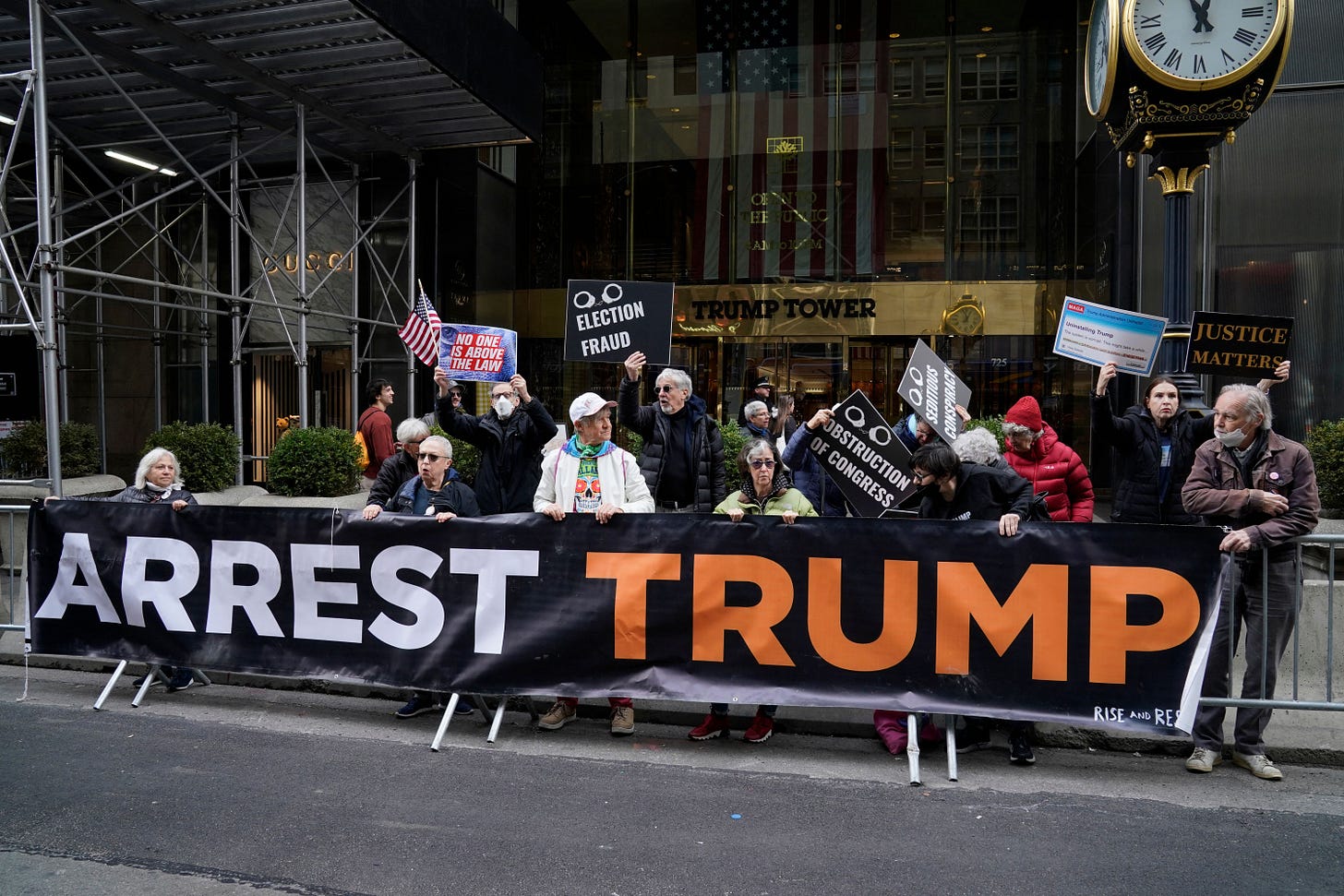Being Indicted Is Still Bad
Whatever the merits of the Manhattan DA's prosecution, I don't buy that it will help Trump win renomination
Dear readers,
My least favorite type of poll question is the kind that asks respondents whether some fact or event or position would make them “more likely” or “less likely” to vote for a politician. For example, here’s one from Emerson last August, in Ohio:
A plurality of Ohio voters (39%) say the recent FBI search of Mar-a-Lago makes them more likely to support Donald Trump for president in 2024, while 35% say it makes them less likely to support Trump; 27% say it makes no difference.
The idea that 73%1 of Ohio voters changed in their likelihood of voting for Trump due to the Mar-a-Lago raid is obvious nonsense. Probably at least 40% of Ohio voters already had a 0% chance of supporting Trump for president in 2024. They should all have answered “no difference.” There’s also a very large chunk of Ohio voters who were going to support Trump next year with 100% probability, even taking the question to mean whether they would support him in a primary election. They also should have answered “no difference.”
But poll respondents don’t take these sorts of questions literally. They interpret the question as though it were “Trump’s house got raided. Do you like Trump?” And if the answer is yes, they say “more likely.” If it’s no, they say “less likely.”
I’ve been thinking about this question in light of Donald Trump’s indictment yesterday in Manhattan and the predictions we’re seeing (from his supporters and his detractors) that this prosecution will help him seal renomination. And honestly, I just don’t get it. I think to some extent, people are looking at advantages Trump already had before the indictment and ascribing them to the indictment — confusing a level with a change, and making the same kind of “more likely” error that poll respondents do. Meanwhile, pundits are too quick to hand-wave away the ordinary and mundane difficulties associated with being criminally prosecuted that can make it harder to do other public activities, like running for president.
I wrote about this back in September, and my theory of the case still holds:
The argument that an indictment helps Trump get nominated relies on the idea that an indictment would return Trump’s grievances to the center of Republican base voter interest. Trump’s claims of persecution would become a core current issue, not relitigation of the past. But I think it’s important to note that Trump’s home has already been raided by the FBI. If he is not indicted, he will still be able to talk about how Democrats and the Deep State are out to get him, but without the burden of actual criminal proceedings. Indeed, if Trump isn’t indicted, he can both rail against the Deep State’s conspiracy to prosecute him and crow that they weren’t able to make it stick.
I think people have been watching Trump’s primary polling numbers tick back up in recent weeks and have concluded that the indictment chatter was good for his political fortunes; therefore, actually being indicted must be even better for him, because it ensures way more news coverage of his alleged persecution. But I think that’s a wrong inference to draw for a few reasons.
First of all, that was indictment chatter, not an indictment, which is different.
Second, the issue over the last few weeks hasn’t just been the subject matter in the news. It’s also that Trump has been overtly campaigning for the presidency during this period. His main opponent, Ron DeSantis, has not. Of course Trump’s legal troubles can block out the sun and move to the top of voters’ consciousness when there is no real campaign; eventually, there will be debates, and Trump will have to litigate his restrictive early record on COVID (“Trump-Fauci”), criminal justice reform, and other matters where DeSantis can effectively attack him from his right.
Third, we have not yet actually seen the text of the indictment. Politically, Trump is in the best possible phase for the indictment — he can attack the prosecutor based on his left-wing political alignment without having to actually discuss what’s in it. Maybe when we see the indictment, we’ll learn that it contains a more compelling legal theory than has been possible to surmise from the outside news coverage; maybe we won’t. Either way, it is sure to be full of embarrassing facts — note DeSantis pointing out that he’s personally unfamiliar with the legal difficulties associated with paying off a pornstar.
Fourth, mounting a legal defense can hamper a political career in certain practical ways. Most obviously, Trump could be sent to prison. Even if the legal theory of the indictment is a stretch, Trump and his allies are right to point out that he will face a very hostile jury pool in Manhattan that might be prepared to stretch. Even before there is a verdict, he will have to devote time and energy to his legal defense, and he will face trade-offs between his PR need to discuss (or campaign on) the charges in public and his legal needs as a defendant, which generally entail shutting up.

Fifth, I would not assume this is the last indictment. Investigations into Trump’s efforts to pressure Georgia officials to steal the election and into his handling of classified documents may well also produce indictments that would likely be on less creative legal ground and involve facts more directly relevant to his potential future service as president.
The way Trump’s legal troubles could help him were already baked in — he was already able to say the Deep State was out to get him, and voters believed him and they cared. The indictment surely wins him more sympathy from Republican voters, but are those voters who will surely say this makes them more likely to back Trump again actually expressing greater likelihood, rather than just their solidarity?
Meanwhile, the most obvious way those legal troubles can hurt him in a primary against Ron DeSantis is the one Jonathan Chait discussed last week:
DeSantis’s pitch to the base is that he can endorse more or less the same positions as Trump and attack all the same enemies but do so more effectively and without all of Trump’s baggage. He is a winner, and Trump is a loser. It doesn’t matter if they think Trump lost because Biden, antifa, and Dominion Voting Systems stole the election. DeSantis refuses even to say Trump legitimately lost. All he needs to get across is that Trump did lose in the undeniable sense that he no longer occupies the White House.
By this way of thinking, Trump’s criminal exposure only makes him even more of a loser. DeSantis will almost surely speak of Trump’s legal predicament in sympathetic terms. Liberal prosecutors and the “Biden regime” (as DeSantis calls it) are abusing their power and persecuting law-abiding citizens like poor Donald. That said, wouldn’t Republicans rather have a nominee who has avoided this misfortune? One with the freedom to run a traditional campaign and who will not be potentially confined to communicating to the public via collect calls from prison?
Like Jonathan, I am unsure whether this pitch will work. But it is surely more likely to work if Trump is actually under indictment than if he is merely rumored to maybe in the future be under indictment.
Very seriously,
Josh
By the way, if you’re interested in the legal issues of indicting a former president (rather than just the politics of it), you should subscribe to Serious Trouble, the podcast I co-host with criminal defense attorney and former AUSA Ken White.
Or maybe it’s 74%; these poll responses add to 101% due to rounding.





The appeal to Trump by his core supporters is clearly emotional. DeSantis: is saying, that he’s the “ boring but effective bureaucrat” that can deliver, without all the crazy. Clearly, DeSantis lacks charisma and any real personal appeal at all. That may be his biggest issue with this group of voters. It was never ( really) about policy at all? Something has to give here.The Republican Party can’t go on like this.
Anyone else notice how in seven years, the Republicans have gone from chanting "LOCK HER UP" on national television (at the 2016 Republican Convention) to suddenly being sooooo concerned about "Innocent Until Proven Guilty" and politically-motivated prosecutions?